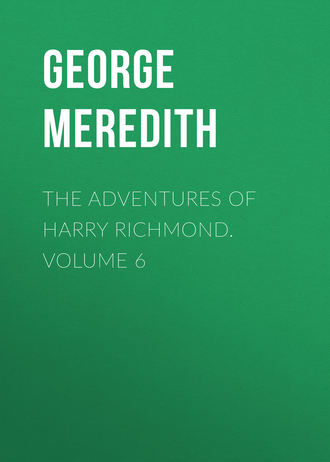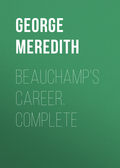
George Meredith
The Adventures of Harry Richmond. Volume 6
My father remarked that he should visit this upon Mr. Alphonse.
'You shook off that fine Welsh girl, and she was in your hand—the act of a madman!' Jorian continued. 'You're getting older: the day will come when you're a flat excitement. You know the first Lady Edbury spoilt one of your best chances when you had the market. Now you're trifling with the second. She's the head of the Light Brigade, but you might fix her down, if she's not too much in debt. You 're not at the end of your run, I dare say. Only, my good Roy, let me tell you, in life you mustn't wait for the prize of the race till you touch the goal—if you prefer metaphor. You generally come forward about every seven years or so. Add on another seven, and women'll begin to think. You can't beat Time, mon Roy.'
'So,' said my father, 'I touch the goal, and women begin to think, and I can't beat time to them. Jorian, your mind is in a state of confusion. I do not marry.'
'Then, Roy Richmond, hear what a friend says . . .'
'I do not marry, Jorian, and you know my reasons.'
'Sentiments!'
'They are a part of my life.'
'Just as I remarked, you are not thorough. You have genius and courage out of proportion, and you are a dead failure, Roy; because, no sooner have you got all Covent Garden before you for the fourth or fifth time, than in go your hands into your pockets, and you say—No, there's an apple I can't have, so I'll none of these; and, by the way, the apple must be tolerably withered by this time. And you know perfectly well (for you don't lack common sense at a shaking, Roy Richmond), that you're guilty of simple madness in refusing to make the best of your situation. You haven't to be taught what money means. With money—and a wife to take care of it, mind you—you are pre-eminently the man for which you want to be recognized. Without it—Harry 'll excuse me, I must speak plainly—you're a sort of a spectacle of a bob-cherry, down on your luck, up on your luck, and getting dead stale and never bitten; a familiar curiosity'
Jorian added, 'Oh, by Jove! it's not nice to think of.' My father said: 'Harry, I am sure, will excuse you for talking, in your extreme friendliness, of matters that he and I have not—and they interest us deeply—yet thought fit to discuss. And you may take my word for it, Jorian, that I will give Alphonse his medical dose. I am quite of your opinion that the kings of cooks require it occasionally. Harry will inform us of Mdlle. Chassediane's commands.'
The contents of the letter permitted me to read it aloud. She desired to know how she could be amused on the Sunday.
'We will undertake it,' said my father. 'I depute the arrangements to you, Jorian. Respect the prejudices, and avoid collisions, that is all.'
Captain DeWitt became by convenient stages cheerful, after the pink slip of paper had been made common property, and from a seriously-advising friend, in his state of spite, relapsed to the idle and shadow-like associate, when pleased. I had to thank him for the gift of fresh perceptions. Surely it would be as well if my father could get a woman of fortune to take care of him!
We had at my request a consultation with Dettermain and Newson on the eve of the journey to Riversley, Temple and Jorian DeWitt assisting. Strange documentary evidence was unfolded and compared with the date of a royal decree: affidavits of persons now dead; a ring, the ring; fans, and lace, and handkerchiefs with notable initials; jewelry stamped 'To the Divine Anastasia' from an adoring Christian name: old brown letters that shrieked 'wife' when 'charmer' seemed to have palled; oaths of fidelity ran through them like bass notes. Jorian held up the discoloured sheets of ancient paper saying:
'Here you behold the mummy of the villain Love.' Such love as it was—the love of the privileged butcher for the lamb. The burden of the letters, put in epigram, was rattlesnake and bird. A narrative of Anastasia's sister, Elizabeth, signed and sealed, with names of witnesses appended, related in brief bald English the history of the events which had killed her. It warmed pathetically when dwelling on the writer's necessity to part with letters and papers of greater moment, that she might be enabled to sustain and educate her sister's child. She named the certificate; she swore to the tampering with witnesses. The number and exact indication of the house where the ceremony took place was stated—a house in Soho;—the date was given, and the incident on that night of the rape of the beautiful Miss Armett by mad Lord Beaumaris at the theatre doors, aided by masked ruffians, after Anastasia's performance of Zamira.
'There are witnesses I know to be still living, Mr. Temple,' my father said, seeing the young student-at-law silent and observant. 'One of them I have under my hand; I feed him. Listen to this.'
He read two or three insufferable sentences from one of the love- epistles, and broke down. I was ushered aside by a member of the firm to inspect an instrument prepared to bind me as surety for the costs of the appeal. I signed it. We quitted the attorney's office convinced (I speak of Temple and myself) that we had seen the shadow of something.
CHAPTER XL
MY FATHER'S MEETING WITH MY GRANDFATHER
My father's pleasure on the day of our journey to Bulsted was to drive me out of London on a lofty open chariot, with which he made the circuit of the fashionable districts, and caused innumerable heads to turn. I would have preferred to go the way of other men, to be unnoticed, but I was subject to an occasional glowing of undefined satisfaction in the observance of the universally acknowledged harmony existing between his pretensions, his tastes and habits, and his person. He contrived by I know not what persuasiveness and simplicity of manner and speech to banish from me the idea that he was engaged in playing a high stake; and though I knew it, and he more than once admitted it, there was an ease and mastery about him that afforded me some degree of positive comfort still. I was still most securely attached to his fortunes. Supposing the ghost of dead Hector to have hung over his body when the inflamed son of Peleus whirled him at his chariot wheels round Troy, he would, with his natural passions sobered by Erebus, have had some of my reflections upon force and fate, and my partial sense of exhilaration in the tremendous speed of the course during the whole of the period my father termed his Grand Parade. I showed just such acquiescence or resistance as were superinduced by the variations of the ground. Otherwise I was spell-bound; and beyond interdicting any further public mention of my name or the princess's, I did nothing to thwart him. It would have been no light matter.
We struck a station at a point half-way down to Bulsted, and found little Kiomi there, thunder in her brows, carrying a bundle, and purchasing a railway-ticket, not to travel in our direction. She gave me the singular answer that she could not tell me where her people were; nor would she tell me whither she was going, alone, and by rail. I chanced to speak of Heriot. One of her sheet-lightning flashes shot out. 'He won't be at Bulsted,' she said, as if that had a significance. I let her know we were invited to Bulsted. 'Oh, she 's at home'; Kiomi blinked, and her features twitched like whip-cord. I saw that she was possessed by one of her furies. That girl's face had the art of making me forget beautiful women, and what beauty was by comparison.
It happened that the squire came across us as we were rounding the slope of larch and fir plantation near a part of the Riversley hollows, leading to the upper heath-land, where, behind a semicircle of birches, Bulsted lay. He was on horseback, and called hoarsely to the captain's coachman, who was driving us, to pull up. 'Here, Harry,' he sang out to me, in the same rough voice, 'I don't see why we should bother Captain William. It's a bit of business, not pleasure. I've got the book in my pocket. You ask—is it convenient to step into my bailiff's cottage hard by, and run through it? Ten minutes 'll tell me all I want to know. I want it done with. Ask.'
My father stood up and bowed, bareheaded.
My grandfather struck his hat and bobbed.
'Mr. Beltham, I trust I see you well.'
'Better, sir, when I've got rid of a damned unpleasant bit o' business.'
'I offer you my hearty assistance.'
'Do you? Then step down and come into my bailiff's.'
'I come, sir.'
My father alighted from the carriage. The squire cast his gouty leg to be quit of his horse, but not in time to check my father's advances and ejaculations of condolence.
'Gout, Mr. Beltham, is a little too much a proof to us of a long line of ancestry.'
His hand and arm were raised in the form of a splint to support the squire, who glared back over his cheekbone, horrified that he could not escape the contact, and in too great pain from arthritic throes to protest: he resembled a burglar surprised by justice. 'What infernal nonsense . . , fellow talking now?' I heard him mutter between his hoppings and dancings, with one foot in the stirrup and a toe to earth, the enemy at his heel, and his inclination half bent upon swinging to the saddle again.
I went to relieve him. 'Damn! . . . Oh, it's you,' said he.
The squire directed Uberly, acting as his groom, to walk his horse up and down the turf fronting young Tom Eckerthy's cottage, and me to remain where I was; then hobbled up to the door, followed at a leisurely march by my father. The door opened. My father swept the old man in before him, with a bow and flourish that admitted of no contradiction, and the door closed on them. I caught a glimpse of Uberly screwing his wrinkles in a queer grimace, while he worked his left eye and thumb expressively at the cottage, by way of communicating his mind to Samuel, Captain Bulsted's coachman; and I became quite of his opinion as to the nature of the meeting, that it was comical and not likely to lead to much. I thought of the princess and of my hope of her depending upon such an interview as this. From that hour when I stepped on the sands of the Continent to the day of my quitting them, I had been folded in a dream: I had stretched my hands to the highest things of earth, and here now was the retributive material money-question, like a keen scythe-blade!
The cottage-door continued shut. The heaths were darkening. I heard a noise of wheels, and presently the unmistakable voice of Janet saying, 'That must be Harry.' She was driving my aunt Dorothy. Both of them hushed at hearing that the momentous duel was in progress. Janet's first thought was of the squire. 'I won't have him ride home in the dark,' she said, and ordered Uberly to walk the horse home. The ladies had a ladies' altercation before Janet would permit my aunt to yield her place and proceed on foot, accompanied by me. Naturally the best driver of the two kept the whip. I told Samuel to go on to Bulsted, with word that we were coming: and Janet, nodding bluntly, agreed to direct my father as to where he might expect to find me on the Riversley road. My aunt Dorothy and I went ahead slowly: at her request I struck a pathway to avoid the pony-carriage, which was soon audible; and when Janet, chattering to the squire, had gone by, we turned back to intercept my father. He was speechless at the sight of Dorothy Beltham. At his solicitation, she consented to meet him next day; his account of the result of the interview was unintelligible to her as well as to me. Even after leaving her at the park-gates, I could get nothing definite from him, save that all was well, and that the squire was eminently practical; but he believed he had done an excellent evening's work. 'Yes,' said he, rubbing his hands, 'excellent! making due allowances for the emphatically commoner's mind we have to deal with.' And then to change the subject he dilated on that strange story of the man who, an enormous number of years back in the date of the world's history, carried his little son on his shoulders one night when the winds were not so boisterous, though we were deeper in Winter, along the identical road we traversed, between the gorsemounds, across the heaths, with yonder remembered fir-tree clump in sight and the waste-water visible to footfarers rounding under the firs. At night-time he vowed, that as far as nature permitted it, he had satisfied the squire—'completely satisfied him, I mean,' he said, to give me sound sleep. 'No doubt of it; no doubt of it, Richie.'
He won Julia's heart straight off, and Captain Bulsted's profound admiration. 'Now I know the man I've always been adoring since you were so high, Harry,' said she. Captain Bulsted sighed: 'Your husband bows to your high good taste, my dear.' They relished him sincerely, and between them and him I suffered myself to be dandled once more into a state of credulity, until I saw my aunt Dorothy in the afternoon subsequent to the appointed meeting. His deep respect and esteem for her had stayed him from answering any of her questions falsely. To that extent he had been veracious. It appeared, that driven hard by the squire, who would have no waving of flags and lighting of fireworks in a matter of business, and whose 'commoner's mind' chafed sturdily at a hint of the necessity for lavish outlays where there was a princess to win, he had rallied on the fiction that many of the cheques, standing for the bulk of the sums expended, were moneys borrowed by him of me, which he designed to repay, and was prepared to repay instantly—could in fact, the squire demanding it, repay, as it were, on the spot; for behold, these borrowed moneys were not spent; they were moneys invested in undertakings, put out to high rates of interest; moneys that perhaps it would not be adviseable to call in without a season of delay; still, if Mr. Beltham, acting for his grandson and heir, insisted, it should be done. The moneys had been borrowed purely to invest them with profit on my behalf: a gentleman's word of honour was pledged to it.
The squire grimly gave him a couple of months to make it good.
Dorothy Beltham and my father were together for about an hour at Eckerthy's farm. She let my father kiss her hand when he was bending to take his farewell of her, but held her face away. He was in manifest distress, hardly master of his voice, begged me to come to him soon, and bowing, with 'God bless you, madam, my friend on earth!' turned his heel, bearing his elastic frame lamentably. A sad or a culprit air did not befit him: one reckoned up his foibles and errors when seeing him under a partly beaten aspect. At least, I did; not my dear aunt, who was compassionate of him, however thoroughly she condemned his ruinous extravagance, and the shifts and evasions it put him to. She feared, that instead of mending the difficulty, he had postponed merely to exaggerate it in the squire's mind; and she was now of opinion that the bringing him down to meet the squire was very bad policy, likely to result in danger to my happiness; for, if the money should not be forthcoming on the date named, all my father's faults would be transferred to me as his accomplice, both in the original wastefulness and the subterfuges invented to conceal it. I recollected that a sum of money had really been sunk in Prince Ernest's coal-mine. My aunt said she hoped for the best.
Mounting the heaths, we looked back on the long yellow road, where the carriage conveying my father to the railway-station was visible, and talked of him, and of the elements of antique tragedy in his history, which were at that period, let me say, precisely what my incessant mental efforts were strained to expel from the idea of our human life. The individual's freedom was my tenet of faith; but pity pleaded for him that he was well-nigh irresponsible, was shamefully sinned against at his birth, one who could charge the Gods with vindictiveness, and complain of the persecution of natal Furies. My aunt Dorothy advised me to take him under my charge, and sell his house and furniture, make him live in bachelor chambers with his faithful waiting-woman and a single manservant.
'He will want money even to do that,' I remarked.
She murmured, 'Is there not some annual income paid to him?'
Her quick delicacy made her redden in alluding so closely to his personal affairs, and I loved her for the nice feeling. 'It was not much,' I said. The miserable attempt to repair the wrongs done to him with this small annuity angered me—and I remembered, little pleased, the foolish expectations he founded on this secret acknowledgement of the justice of his claims. 'We won't talk of it,' I pursued. 'I wish he had never touched it. I shall interdict him.'
'You would let him pay his debts with it, Harry?'
'I am not sure, aunty, that he does not incur a greater debt by accepting it.'
'One's wish would be, that he might not ever be in need of it.'
'Ay, or never be caring to find the key of it.'
'That must be waste of time,' she said.
I meant something else, but it was useless to tell her so.
CHAPTER XLI
COMMENCEMENT OF THE SPLENDOURS AND PERPLEXITIES OF MY FATHER'S GRAND PARADE
Janet, in reply to our inquiries as to the condition of the squire's temper, pointed out in the newspaper a notification of a grand public Ball to be given by my father, the first of a series of three, and said that the squire had seen it and shrugged. She thought there was no positive cause for alarm, even though my father should fail of his word; but expressed her view decidedly, that it was an unfortunate move to bring him between the squire and me, and so she blamed Captain Bulsted. This was partly for the reason that the captain and his wife, charmed by my father, were for advocating his merits at the squire's table: our ingenuity was ludicrously taxed to mystify him on the subject of their extravagant eulogies. They told him they had been invited, and were going to the great London Balls.
'Subscription Balls?' asked the squire.
'No, sir,' rejoined the captain.
'Tradesmen's Balls, d' ye call 'em, then?'
'No, sir; they are Balls given by a distinguished gentleman.'
'Take care it's not another name for tradesmen's Balls, William.'
'I do not attend tradesmen's Balls, sir.'
'Take care o' that, William.'
The captain was very angry. 'What,' said he, turning to us, 'what does the squire mean by telling an officer of the Royal Navy that he is conducting his wife to a tradesmen's Ball?'
Julia threatened malicious doings for the insult. She and the squire had a controversy upon the explication of the word gentleman, she describing my father's appearance and manners to the life. 'Now listen to me, squire. A gentleman, I say, is one you'd say, if he wasn't born a duke, he ought to have been, and more shame to the title! He turns the key of a lady's heart with a twinkle of his eye. He 's never mean—what he has is yours. He's a true friend; and if he doesn't keep his word, you know in a jiffy it's the fault of affairs; and stands about five feet eleven: he's a full-blown man': and so forth.
The squire listened, and perspired at finding the object of his abhorrence crowned thus in the unassailable realms of the abstract. Julia might have done it more elegantly; but her husband was rapturous over her skill in portraiture, and he added: 'That's a gentleman, squire; and that 's a man pretty sure to be abused by half the world.'
'Three-quarters, William,' said the squire; 'there's about the computation for your gentleman's creditors, I suspect.'
'Ay, sir; well,' returned the captain, to whom this kind of fencing in the dark was an affliction, 'we make it up in quality—in quality.'
'I 'll be bound you do,' said the squire; 'and so you will so long as you 're only asked to dance to the other poor devils' fiddling.'
Captain Bulsted bowed. 'The last word to you, squire.'
The squire nodded. 'I 'll hand it to your wife, William.'
Julia took it graciously. 'A perfect gentleman! perfect! confound his enemies!'
'Why, ma'am, you might keep from swearing,' the squire bawled.
'La! squire,' said she, 'why, don't you know the National Anthem?'
'National Anthem, ma'am! and a fellow, a velvet-tongued—confound him, if you like.'
'And where's my last word, if you please?' Julia jumped up, and dropped a provoking curtsey.
'You silly old grandada!' said Janet, going round to him; 'don't you see the cunning woman wants to dress you in our garments, and means to boast of it to us while you're finishing your wine?'
The old man fondled her. I could have done the same, she bent over him with such homely sweetness. 'One comfort, you won't go to these gingerbread Balls,' he said.
'I'm not invited,' she moaned comically.
'No; nor shan't be, while I can keep you out of bad company.'
'But, grandada, I do like dancing.
'Dance away, my dear; I've no objection.'
'But where's the music?'
'Oh, you can always have music.'
'But where are my partners?'
The squire pointed at me.
'You don't want more than one at a time, eh?' He corrected his error: 'No, the fellow's engaged in another quadrille. Mind you, Miss Janet, he shall dance to your tune yet. D' ye hear, sir?' The irritation excited by Captain Bulsted and Julia broke out in fury. 'Who's that fellow danced when Rome was burning?'
'The Emperor Nero,' said Janet. 'He killed Harry's friend Seneca in the eighty-somethingth year of his age; an old man, and—hush, grandada!' She could not check him.
'Hark you, Mr. Harry; dance your hardest up in town with your rips and reps, and the lot of ye; all very fine while the burning goes on: you won't see the fun of dancing on the ashes. A nice king of Rome Nero was next morning! By the Lord, if I couldn't swear you'll be down on your knees to an innocent fresh-hearted girl 's worth five hundred of the crew you're for partnering now while you've a penny for the piper.'
Janet shut his mouth, kissed him, and held his wine up. He drank, and thumped the table. 'We 'll have parties here, too. The girl shall have her choice of partners: she shan't be kept in the background by a young donkey. Take any six of your own age, and six sensible men, to try you by your chances. By George, the whole dozen 'd bring you in non-compos. You've only got the women on your side because of a smart face and figure.'
Janet exclaimed indignantly, 'Grandada, I'm offended with you'; and walked out on a high step.
'Come, if he has the women on his side,' said Captain Bulsted, mildly.
'He'll be able to go partnering and gallopading as long as his banker 'll let him, William—like your gentleman! That's true. We shall soon see.'
'I leave my character in your hands, sir,' said I, rising. 'If you would scold me in private, I should prefer it, on behalf of your guests; but I am bound to submit to your pleasure, and under any circumstances I remember, what you appear to forget, that you are my grandfather.'
So saying, I followed the ladies. It was not the wisest of speeches, and happened, Captain Bulsted informed me, to be delivered in my father's manner, for the squire pronounced emphatically that he saw very little Beltham in me. The right course would have been for me to ask him then and there whether I had his consent to start for Germany. But I was the sport of resentments and apprehensions; and, indeed, I should not have gone. I could not go without some title beyond that of the heir of great riches.
Janet kept out of my sight. I found myself strangely anxious to console her: less sympathetic, perhaps, than desirous to pour out my sympathy in her ear, which was of a very pretty shape, with a soft unpierced lobe. We danced together at the Riversley Ball, given by the squire on the night of my father's Ball in London. Janet complimented me upon having attained wisdom. 'Now we get on well,' she said. 'Grandada only wants to see us friendly, and feel that I am not neglected.'
The old man, a martyr to what he considered due to his favourite, endured the horror of the Ball until suppertime, and kept his eyes on us two. He forgot, or pretended to forget, my foreign engagement altogether, though the announcement in the newspapers was spoken of by Sir Roderick and Lady Echester and others.
'How do you like that?' he remarked to me, seeing her twirled away by one of the young Rubreys.
'She seems to like it, sir,' I replied.
'Like it!' said he. 'In my day you wouldn't have caught me letting the bloom be taken off the girl I cared for by a parcel o' scampish young dogs. Right in their arms! Look at her build. She's strong; she's healthy; she goes round like a tower. If you want a girl to look like a princess!'
His eulogies were not undeserved. But she danced as lightly and happily with Mr. Fred Rubrey as with Harry Richmond. I congratulated myself on her lack of sentiment. Later, when in London, where Mlle. Jenny Chassediane challenged me to perilous sarabandes, I wished that Janet had ever so small a grain of sentiment, for a preservative to me. Ottilia glowed high and distant; she sent me no message; her image did not step between me and disorder. The whole structure of my idea of my superior nature seemed to be crumbling to fragments; and beginning to feel in despair that I was wretchedly like other men, I lost by degrees the sense of my hold on her. It struck me that my worst fears of the effect produced on the princess's mind by that last scene in the lake-palace must be true, and I abandoned hope. Temple thought she tried me too cruelly. Under these circumstances I became less and less resolutely disposed to renew the forlorn conflict with my father concerning his prodigal way of living. 'Let it last as long as I have a penny to support him!' I exclaimed. He said that Dettermain and Newson were now urging on his case with the utmost despatch in order to keep pace with him, but that the case relied for its life on his preserving a great appearance. He handed me his division of our twin cheque-books, telling me he preferred to depend on his son for supplies, and I was in the mood to think this a partial security.
'But you can take what there is,' I said.
'On the contrary, I will accept nothing but minor sums—so to speak, the fractional shillings; though I confess I am always bewildered by silver,' said he.
I questioned him upon his means of carrying on his expenditure. His answer was to refer to the pavement of the city of London. By paving here and there he had, he informed me, made a concrete for the wheels to roll on. He calculated that he now had credit for the space of three new years—ample time for him to fight his fight and win his victory.
'My tradesmen are not like the tradesmen of other persons,' he broke out with a curious neigh of supreme satisfaction in that retinue. 'They believe in me. I have de facto harnessed them to my fortunes; and if you doubt me on the point of success, I refer you to Dettermain and Newson. All I stipulate for is to maintain my position in society to throw a lustre on my Case. So much I must do. My failures hitherto have been entirely owing to the fact that I had not my son to stand by me.'
'Then you must have money, sir.'
'Yes, money.'
'Then what can you mean by refusing mine?'
'I admit the necessity for it, my son. Say you hand me a cheque for a temporary thousand. Your credit and mine in conjunction can replace it before the expiration of the two months. Or,' he meditated, 'it might be better to give a bond or so to a professional lender, and preserve the account at your bankers intact. The truth is, I have, in my interview with the squire, drawn in advance upon the, material success I have a perfect justification to anticipate, and I cannot allow the old gentleman to suppose that I retrench for the purpose of giving a large array of figures to your bankers' book. It would be sheer madness. I cannot do it. I cannot afford to do it. When you are on a runaway horse, I prefer to say a racehorse,—Richie, you must ride him. You dare not throw up the reins. Only last night Wedderburn, appealing to Loftus, a practical sailor, was approved when he offered—I forget the subject-matter—the illustration of a ship on a lee-shore; you are lost if you do not spread every inch of canvas to the gale. Retrenchment at this particular moment is perdition. Count our gains, Richie. We have won a princess . . .'







